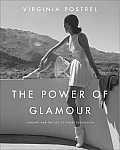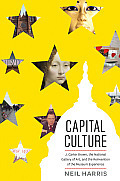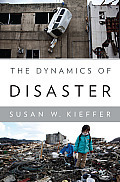3 Nons, all Catch-up
(I know: every year around now it’s a scramble to get to books that were read and, for whatever reason, untouched-upon here. All of these books are worth your energy and time, even if the reviews here are brief.)
 The Power of Glamour by Virginia Postrel
The Power of Glamour by Virginia Postrel
This book is borderline profound, and that it’s not totally isn’t, necessarily, a mark of any lack: Postrel’s trying to do something fairly grand, in that she’s trying to articulate a whole bunch of stuff about what glamour is and how (and how deeply) it appeals. To do such a thing requires addressing a shelf of abstractions—beauty, style, longing, grace, mystery (to say nothing of class)—and one can sort of see, fairly quick out the gates, how tough such a task would be (just try to define even one of those terms). Glamour, Postrel writes, is basically a believable illusion—this come-hither thing we strive toward (that’s a brutal paring of Postrel’s developed idea), and here, ultimately, is the issue for me with the book: it’s powerful, and it’s impossible to walk from this book not thinking differently about things, and yet…see, this is where it gets hard. Of course there’s not gonna be one book which objectively articulates everything about The Power of Glamour, same as there’s not gonna be one book which objectively articulates everything about, say, Bob Dylan, or archicture. This is getting dicey quickly. What I’d say is this: this is a gorgeous book that will blast you wide open and make you think about conceptions of lots of social appearance things in a much more significant way, very quickly, even if, in the end, you find yourself disagreeing with Postrel about certain things. That The Power of Glamour is not a perfectly coherent book is, the more I reflect on it, a gimme: no one faults Marcus for not Totally Nailing everything about Dylan (or Elvis or whoever), and anyway one ends up feeling massively appreciative simply for the book’s existence, for the fact that it’s opening—quite widely—a conversation the reader may not’ve even been aware s/he’d been longing to listen in on. Anyway: read it (of note, too: it’s a lusciously beautiful book, physically).
Capital Culture by Neil Harris

Weirdly, this book resonates with another I’ve been dabbling in recently (Shone’s Blockbuster): through tracing J Carter Brown’s leadership at the National Gallery of Art, Neil Harris shows the reader how we have come to experience museums as we have. That’s a vague sentiment. Try this: when you go into nearly any major museum in the US, you likely enter a large open space and immediately have the opportunity to purchase stuff from the gift shop and there’s also, somewhere, some cafe-ish upscale food on offer, and the whole trip can end up feeling more like cultural consumption rather than cultural appreciation or anything so elitist and sniffy. Harris, in this heavy-duty+large book, argues (to my mind incredibly convincingly) that we’ve got J Carter Brown to thank for how we currently understand and function within museums, and though one leaves the book with more of a contextualized understanding of Brown than anything resembling straight bio, it is, to this itenerant museum-goer and art consumer, a hugely engaging read: I hadn’t even thought to consider that the contemporary museum experience might’ve once been otherwise (not, at least, in any real way: I just assumed in the past there was some Difference, the same as I consider for just about every experience). It’s a dense but ruthlessly engaging book.
 The Dynamics of Disaster by Susan W Kieffer
The Dynamics of Disaster by Susan W Kieffer
Kieffer—a woman you should know more about and to which end you should go here—in The Dynamics of Disaster addresses “changes of state,” which is a sort of fancy heading under which one could put all sorts of things. What Kieffer’s examining here are the physical changes on the earth, and the catastrophes such changes unleash and usher and etc. It’s hard to know how to talk about this book: it’s deeply informative (trying to wrap one’s mind around the distances plates travel in creating earthquakes is a lesson in incredulity), but also deeply (and I don’t mean this entirely critically) pedestrian. This is a book which reads almost as something like a primer for or manual regarding the darker gearing of the earth iself: when weather coalesces to, say, cause a tornado (say, for instance, the tornado that destroyed much of my college during my freshman year), most of us are left—by necessity—reckoning with the manifestations of the tornado: bricks pulled from the chapel, windows blown out, etc. Kieffer takes the reader deeper into the how of the tornado (or earthquake, or whatever), and, to that end, the book’s entirely great and wonderful…it’s just staid. That said, whatever it lacks in the riveting category, The Dynamics of Disaster more than makes up for in the wait, seriously? category.





